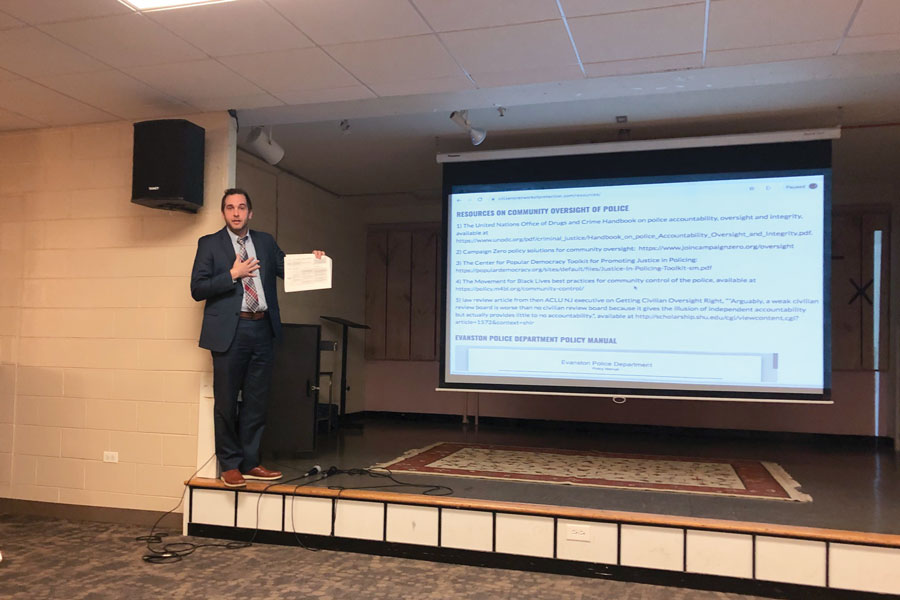Citizens Network of Protection discusses possible police oversight methods
Jacob Fulton/The Daily Northwestern
Austin Spiller, the second vice president of CNP presents at the group’s Friday meeting. Spiller has been involved with the group on a volunteer basis since 2015, and hopes to push for more citizen-led police oversight.
March 1, 2020
Citizens Network of Protection, an Evanston-based police oversight and advocacy group, met Friday to renew its calls for improvements in the Evanston Police Department’s review and complaint processes in the wake of police chief Demitrous Cook publicly sharing mugshots and personal information.
The group, which was formed in 2008, has worked for systematic change in how the city approaches complaints filed against police officers. Currently, the Citizens’ Police Advisory Committee handles any complaints, but CNP is pushing for a restructuring that gives the committee more influence and will create more transparency in the review process.
After Cook on Feb.17 posted over 30 mugshots to his personal Snapchat story, the group has renewed its calls for organizational revisions, citing the incident — and subsequent unclear disciplinary procedures — as proof that citizens should have more influence in the management of EPD.
Austin Spiller, the second vice president of CNP, has been involved with the group since 2015, when he started working with the organization as a volunteer while he was a law student at Loyola University Chicago. He said an oversight board with more extensive influence would be better suited to act with citizens’ best interests in mind after the February incident.
“This would be an instance where, if the civilian oversight board believed it was warranted, they would have the power and authority to look deeper into the matter,” Spiller said. “If they felt like discipline was warranted, they would be able to achieve binding disciplinary recommendations.”
The photos Cook posted were exclusively of black men. He said this was because they fit the profile of possible subjects for future investigations. In general, communities of color are disproportionately affected by police activities.
According to the Illinois Department of Transportation, minority groups made up 47 percent of traffic stops state-wide in 2018, despite only being 23.1 percent of the state’s population. Because of this, he said he feels a powerful civilian review board is essential.
Some of the group’s suggestions include giving the board the power to hire and fire the police chief and a requirement that all civilian complaints must be thoroughly investigated and resolved within 120 days after they are filed. Currently, there is no time constraint placed on resolutions.
Evanston resident Carlis Sutton said because of the current board’s limited capabilities, it can be difficult for residents to get justice for their complaints, which is why he feels a restructuring is essential.
“If this board is established, and there’s equal representation from the city, this changes the fact that the only way a person who’s been victimized by the police could be through going to court,” Sutton said. “There should be another way.”
Ald. Ann Rainey (8th) attended the meeting, and said she would be interested in seeing how the current members of the Citizens’ Police Advisory Committee would react to the proposed changes.
Rainey said she observed a high level of cancellations for the committee’s meetings, and she was unsure if it was a result of the low level of complaints, or whether it meant the group needed to continue to evaluate how it functioned even without complaints to review.
“I have always felt that the people on that committee have been appointed as some kind of reward for something,” Rainey said. “They’re very much not out in the public.”
CNP president Betty Ester said she thinks the empowerment of residents to hold police officers to high standards will create better relationships between EPD and the community. She said distrust of police can result from a system that makes it difficult to report complaints.
Ester said the only way these systematic changes can occur are through citizen-driven movements, which is why she feels it is important for CNP to continue to push for more accountability.
“The minute that you stay silent, you are complicit with everything that happened in your community,” Ester said. “And we need to stand up and get people out to speak on these issues.”
Email: [email protected]
Twitter: @jacobnfulton1


